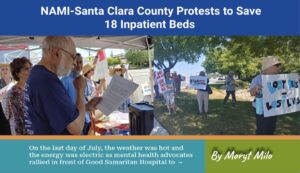 By Moryt Milo
By Moryt Milo
On the last day of July, the weather was hot and the energy was electric as mental health advocates rallied in front of Good Samaritan Hospital to protest the closure of 18 inpatient psychiatric beds at Mission Oaks Hospital in Los Gatos.
Mission Oaks, part of San Jose-based Good Samaritan Hospital, is owned by HCA Healthcare, a multi-billion-dollar public company headquartered in Tennessee. The parent company announced on May 22 plans to close its inpatient psychiatric facility and its pediatric intensive care unit (PICU) at Mission Oaks.
HCA said the behavioral health inpatient services will shutter because Good Samaritan has been unable to hire physicians and psychiatric clinicians including therapists and licensed clinical social workers.
The closure of these 18 beds will compound the critical shortage of inpatient psychiatric beds for individuals covered by commercial insurance. Currently, there are only 211 such beds in Santa Clara County—80 beds at San Jose Behavioral Health Hospital, 36 beds at El Camino Hospital, 29 beds at Stanford Hospital, 48 beds at Santa Clara Valley Medical Center, and the 18 beds at Mission Oaks.
This bed loss will reduce the stock by 9% in a county with a population of close to two million people. According to the California Hospital Association’s most recent psychiatric bed report, there should be 50 inpatient psychiatric beds per 100,000 residents; the county is short 960 beds.
Although NAMI-Santa Clara County spearheaded the protest on July 31, NAMI affiliates from Contra Costa, Alameda, the East Bay, and Tri-Valley, along with FASMI (Families Advocating for the Seriously Mentally Ill) and the Northern California Commission on Psychiatric Resources (NCCPR) from San Francisco joined forces to voice their frustration and displeasure about the decision.
The objective was to persuade HCA not to delicense the psychiatric facility but to deactivate the beds for now and work with the county or another healthcare provider to enable the location to be repurposed, perhaps as an inpatient chemical dependency treatment facility. The need for long-term detox facilities parallels in many ways with mental health services. It is not uncommon for individuals to have a dual diagnosis, and a need for substance use addiction and mental illness services.
Community Action
The protest attracted numerous public officials and long-time advocates who spoke at the event including retired state Sen. Jim Beall, Assemblymember Ash Kalra, and former El Camino Hospital Executive Director of behavioral health and addiction services Michael Fitzgerald. Others included Los Gatos Mayor Maria Ristow, Los Gatos Councilmember Rob Moore, County Supervisor Cindy Chavez’s Chief of Staff Betty Duong, district representative Estefany Meza for state Sen. David Cortese, and Sally Lieber from the California State Board of Equalization.
Beall said, “I honestly don’t know anybody who would ever give a mental health psychiatric facility a 90-day eviction notice. Where are these people going to go? A lot of these people will remain untreated.”
The closure of the facility is not just a Santa Clara County problem, it is a regional problem that touches families throughout Northern California. When beds are full at local hospitals, patients are transferred to facilities in the East Bay, Central Valley or elsewhere, as providers seek out inpatient psychiatric care for those in crisis, Beall said.
“There is a case here for the state to intervene and say we are not going to deal with you guys until you deal with this problem,” Beall said, referring to HCA and their mega Good Samaritan Hospital expansion.
He pointed out that HCA said they were unable to find qualified staff, and yet, where will all the staff come from to treat patients in its one-million-square-feet expansion?
“Let’s sit down and talk and work this out for the benefit of the people we care about,” he told a fired-up crowd.
Assemblymember Kalra didn’t mince words either. He was angry about the closure and saw it as “an abandonment of our public officials,” when a large corporation like HCA doesn’t find a particular service like acute psychiatric care profitable.
“[HCA] places profits over the needs of some of the most vulnerable people and asks the county to step in and have the people of Santa Clara County foot the bill,” he said.
Individuals with severe mental illness are the ones who end up cycling in and out of the mental health system untreated or not treated long enough for successful outcomes. Many are adult children who end up on the streets or in jail. In some cases, families don’t bail their loved ones out of jail because it’s the only place these individuals can receive treatment.
Of those incarcerated in the Santa Clara County Jail, more than 25% have a mental illness. The jails and prisons in the United States have become the largest mental health service providers in the nation.
In the end, HCA had made up its mind the day it released the closure news. The corporation never demonstrated any interest in negotiating with the county or any local behavioral health providers. In fact, the inpatient psych unit was closed a week earlier than expected. Now the odds for someone in need of an acute inpatient bed have shrunk in Santa Clara County, while finding treatment for those with severe mental illness has become harder.
Watch our Instagram coverage of the protest. Click here and here.










































